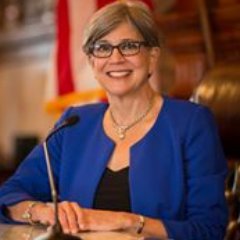Sen. Anthony Hensley, a Topeka Democrat, submitted a motion to move a House bill for Medicaid expansion out of committee and onto the Senate’s debate calendar last week. Hensley offered his motion moments before the Senate adjourned for the legislature’s annual month-long break. Lawmakers won’t vote on it until May 1.
The Kansas House passed Medicaid expansion using parliamentary procedures — a gut-and-go of a different bill and overruling a decision by the House Rules Committee.
Since then, the expansion measure – which seeks to add 130,000 people to Kansas welfare roles – has languished in a Senate committee. Senate leadership controls the debate calendar, but if 24 Senators vote in favor of Hensley’s motion, they can move legislation out of committee without leadership’s blessing.
“The purpose for this motion is to allow for debate and vote on Medicaid expansion on the floor of the Senate this legislative session,” Hensley told lawmakers last Friday.
If that motion is successful, Hensley faces a taller hurdle in order to reach his ultimate goal. He’ll need 27 votes on another procedural motion in order to force debate and a vote on expansion.
“As far as getting to 27, that’s not going to happen. Ever,” said Harrison Hems, chief of staff to Senate President Susan Wagle.
If Hems is wrong, and Hensley’s efforts are successful, Medicaid expansion is likely to become law as soon as it reaches the governor’s desk. Gov. Laura Kelly has made expanding Medicaid a centerpiece of her agenda.
In a press conference last week, the Democratic Governor urged the legislature to vote on expansion.
“No more stall tactics. No more bait and switch. No more excuses,” she said. “…The issue has been studied from every possible angle.”

However, Wagle said in a competing press conference that she believes Medicaid needs reform, not expansion. Officials estimate the current expansion proposal would cost the state an estimated half billion over the next 10 years.
“We cannot saddle taxpayers with this huge financial liability and another tax increase,” Wagle said. “We must work toward finding the proper solution to the soaring and affordable costs of healthcare. Expanding on a failed system that has become too expensive for most Americans is not the answer.”
Thirty-six states and the District of Columbia have expanded Medicaid, and according to research by the Civitas Institute, expansion has overrun projected costs in every state with available data.
Kelly mentioned that the federal government will pay up to 90 percent of the costs of the program in her press conference last week but lawmakers eliminated from the budget funding to cover expansion. Lawmakers also killed Kelly’s proposal to reamoratize Kansas’s public pension system to help bolster the state’s budget over the short term. Taken together, these two actions represent a serious blow to Kelly’s budget priorities, including plans to expand Medicaid. Despite a Kansas Policy Institute analysis that shows the state faces a nearly $2 billion shortfall by 2023, Republican leadership acknowledges that there are enough votes in the legislature to pass expansion.
“We have a Democrat governor. There will be a time when we won’t be able to maneuver around it,” Senate Majority Leader Jim Denning, a Johnson County Republican, told a television station.
Wagle, the Senate President, told reporters that she anticipates creating an interim legislative committee to study expansion once the session concludes. The goal, she said, would be to make expansion more palatable to Republicans, which could mean adding work requirements for recipients or requiring co-pays for using the emergency room for non-emergencies.
“If the train is coming, we might as well try to build a train we want to be on,” Hems said.
Majorities in the House and Senate passed Medicaid expansion in 2017 and then-Gov. Sam Brownback vetoed it. Senators haven’t faced re-election since that time, and 25 Senators voted in favor of expansion two years ago. However, getting 24 votes on a procedural motion this session may pose a challenge.
Four Senate seats have changed hands since the chamber last voted on expansion. Sen. Vic Miller replaced Kelly when she became governor, and Sen. Mary Ware replaced Lynn Rogers when he became lieutenant governor. Republican Sen. Kevin Braun replaced former Sen. Steve Fitzgerald, who resigned, and Republican Sen. Eric Rucker replaced former Sen. Vicki Schmidt when she became insurance commissioner. One or more could vote differently than their predecessors.
Additionally, Hems said Republicans who chair committees are unlikely to vote against Senate leadership on a procedural vote, like Hensley’s motion. Doing so could jeopardize their leadership roles.
“They may be in favor of voting for Medicaid expansion, but they’re in leadership,” Hems said.


